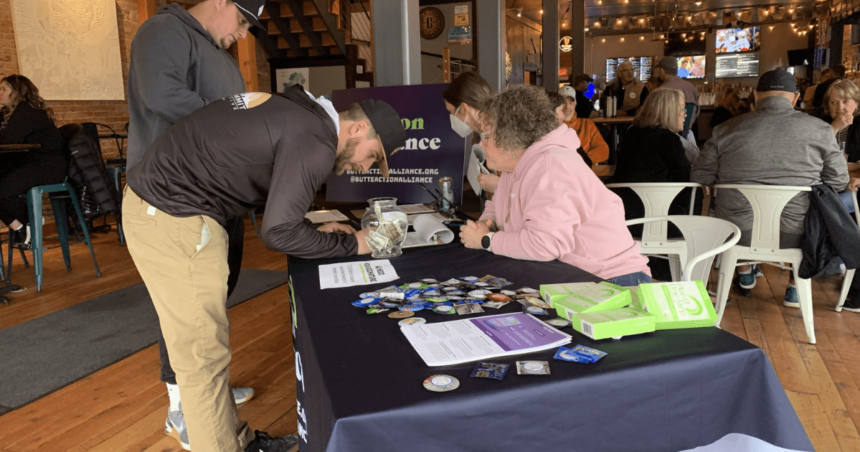Gwendolyn Chilcote made sure to grab the attention of patrons entering a bar in uptown Butte. Dressed in a pink sweatshirt on a Tuesday in mid-May, she welcomed them with a bright smile and direct eye contact. As they passed by, she asked a simple question to engage as many people as possible.
“Have you signed the petition for reproductive rights yet?”
Two bearded men in their early 30s, wearing hoodies and baseball hats, were among the patrons. Intrigued, they circled back to learn more about supporting Constitutional Initiative-128, the petition Chilcote was promoting on behalf of the local reproductive rights group Butte Action Alliance.
The men, both registered voters, signed the petition after understanding that it will put CI-128 on the ballot. Chilcote emphasized that gathering over 60,000 signatures would allow voters in November to decide on keeping pregnancy decisions between a woman and her doctor in Montana.
As the deadline for submitting verified signatures approached, the tension around CI-128 was palpable. Supporters and opponents acknowledged the uncertainty of getting the initiative on the ballot, given the delays caused by a court battle. Despite the challenges, MSRR was cautiously pushing forward with a strategy that focused on door-to-door outreach rather than large public events.
Opponents, organized under the Montana Life Defense Fund, were actively working to prevent CI-128 from advancing. Their tactics included videotaping signature gatherers and filing complaints against the MSRR campaign, alleging violations in signature gathering. The opposition’s efforts reflected a fear of the initiative going before voters and potentially becoming law.
Despite the obstacles, MSRR volunteers continued their signature-gathering efforts, facing occasional resistance from opponents but mostly encountering enthusiastic support. The tension and uncertainty surrounding the campaign underscored the importance of CI-128 to both sides of the abortion rights debate in Montana.
Organized Opposition
The Montana Life Defense Fund, led by prominent figures in the conservative Christian community, focused on disrupting CI-128 volunteers and raising doubts about the initiative’s implications. Their tactics included videotaping signature gatherers and training volunteers to deter petitioners from supporting CI-128.
While the opposition’s efforts seemed to have caused some disruption, MSRR remained focused on collecting signatures and ensuring the initiative’s progress towards the ballot. The tense political environment led to a cautious approach in sharing specific signature numbers or locations to avoid further harassment of volunteers.
With the campaign approaching a critical phase, volunteers like Lillian Thomas in Missoula continued their efforts to gather signatures and engage with potential supporters. Despite challenges and occasional opposition, the grassroots movement for CI-128 remained determined to see the initiative through to the ballot.
A Cautious Approach
As the campaign progressed, concerns about aggression and threats from opponents influenced the strategy of seeking signatures one by one, rather than through large public events. While this approach may have limited visibility, it aimed to protect volunteers from potential confrontations.
Despite the challenges and frustrations, volunteers like Thomas remained committed to the cause, engaging with supporters and addressing concerns about the initiative. The ongoing efforts of both supporters and opponents highlighted the high stakes and deep divisions surrounding CI-128 in Montana.





